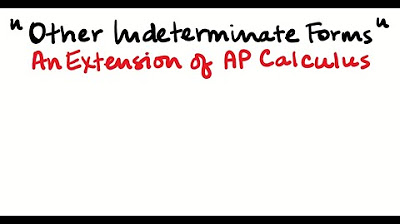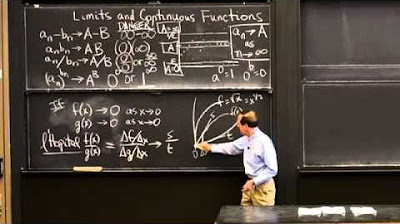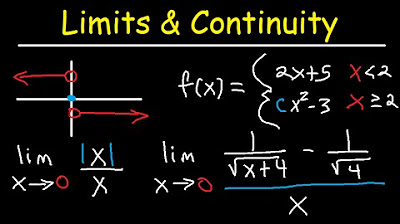1 ^ ∞, It's Not What You Think
TLDRThe video script delves into the mathematical conundrum of one to the power of infinity. It explains that while traditional exponent rules apply for finite numbers, the concept of infinity as an exponent leads to indeterminate forms. The script explores using calculus limits and logarithms to approach the problem, but acknowledges the limitations due to infinity's unique nature. It suggests a potential intuitive definition where one to the infinity equals one, yet warns this is non-traditional and not universally accepted.
Takeaways
- 🤔 The concept of 1 to the power of infinity is not straightforward and feels intuitively true but lacks a clear definition.
- 📈 Exponents for finite numbers involve multiplying the base by itself exponent times, but this doesn't apply to infinite exponents.
- 🌐 Calculus techniques using limits can approach infinity through functions but yield indeterminate forms when applied to 1 to the infinity.
- 📚 Two different functions, 1 + 1/x and 1 + 1/x^2, when taking limits as x approaches infinity, give different results.
- 🔄 Logarithms, as the inverse of exponents, can simplify exponential expressions but do not resolve the issue with infinity as an exponent.
- 🚫 Traditionally, 1 to the power of infinity is undefined because infinity is not considered a number.
- 💡 A new mathematical system could be devised to define 1 to the power of infinity, but it would be non-traditional and potentially controversial.
- 🌟 One intuitive approach is to define 1 to the infinity as the limit of 1 to the x power as x approaches infinity, which equals 1.
- 📏 Infinity is a concept used in calculus and represents a limit rather than a numerical value.
- 🤖 The video script explores the mathematical challenges and philosophical implications of dealing with infinity in exponents.
- 📖 The discussion encourages critical thinking about the limitations and potential extensions of traditional mathematical definitions.
Q & A
What is the traditional value of 1 to the power of any real number?
-Traditionally, 1 raised to the power of any real number is always 1, because any number multiplied by itself zero times results in the original number.
What does the script mean by 'one to the infinity'?
-The phrase 'one to the infinity' refers to the mathematical expression where 1 is raised to the power of infinity. This is a concept that does not have a traditional, well-defined value in standard mathematics.
Why is the concept of one to the infinity considered indeterminate?
-One to the infinity is considered indeterminate because there are multiple ways to approach the problem using limits, leading to different results. The expressions do not converge to a single value, making it impossible to determine an exact value without further context or definition.
How does the script suggest handling the indeterminate form of one to the infinity?
-The script suggests that one way to handle the indeterminate form is by defining a new mathematical system where 1 to the infinity could be given a specific value, such as the limit of 1 raised to the power of x as x approaches infinity, which would be 1.
What role does calculus play in trying to understand one to the infinity?
-Calculus, specifically the technique of limits, is used to approach infinity in a mathematical sense. By examining functions that grow towards positive infinity, we can attempt to understand the behavior of expressions like 1 to the infinity. However, the script points out that this leads to different results for different functions, highlighting the indeterminate nature of the expression.
What is the issue with using logarithms to evaluate one to the infinity?
-Using logarithms to evaluate one to the infinity is problematic because the logarithm of 1 is 0, and multiplying infinity by 0 does not yield a well-defined result. This creates a new set of complications and does not provide a clear answer to the value of one to the infinity.
Why does the script mention that one to the infinity is traditionally undefined?
-The script mentions that one to the infinity is traditionally undefined because, in standard mathematical definitions, exponentiation is only well-defined for finite numbers. Infinity is not considered a number, but rather a concept representing an unbounded quantity, making the exponentiation of 1 by infinity undefined in conventional terms.
How does the script propose a potential resolution to the issue of one to the infinity?
-The script proposes a potential resolution by suggesting the creation of a new mathematical system where one to the infinity could be defined. This new system would use the limit as x approaches infinity of 1 to the x power, which would evaluate to 1, aligning with the intuitive expectation.
What is the significance of the phrase 'one to the infinity equals 1'?
-The phrase 'one to the infinity equals 1' represents a potential definition within a new mathematical system that aims to give a value to an expression that is traditionally undefined. It reflects an intuitive approach to the problem, where one could naturally think that 1 multiplied by itself an infinite number of times should remain 1.
What caution does the script provide regarding the proposed definition of one to the infinity?
-The script cautions that while the proposed definition of one to the infinity as 1 may align with intuition, it is not traditionally defined this way. Using this definition outside of the context of the proposed system could lead to disagreement with mathematically trained individuals, as it would not conform to standard mathematical conventions.
How does the script address the concept of infinity in mathematics?
-The script addresses infinity as a concept that represents an unbounded quantity, distinct from finite numbers. It is not traditionally considered a number, which is why operations involving infinity, such as exponentiation, can lead to indeterminate forms or require special handling through techniques like limits or logarithms.
Outlines
🤔 Understanding One to the Infinity Power
This paragraph delves into the mathematical conundrum of one raised to the power of infinity. It begins by establishing basic exponent rules, such as one to any real number equals one, and then poses the question of what one to the infinity power might mean. The discussion highlights the challenges in defining this operation, as traditional exponent rules fail when faced with infinity. It introduces the concept of using calculus techniques like limits to approach the problem and the issues that arise from such attempts. The paragraph also touches on the use of logarithms as another potential method to tackle the problem, but acknowledges the limitations when the exponent is infinity. The key point is that one to the infinity power is traditionally undefined, but the video suggests a possible way to define it within a new mathematical framework by using limits, although this is not widely accepted.
Mindmap
Keywords
💡Infinity
💡Exponents
💡Limits
💡Indeterminate Form
💡Logarithms
💡Calculus
💡Functions
💡One to the Power of Infinity
💡Traditionally Undefined
💡New Mathematical System
Highlights
One to the power of one is one, showcasing the basic property of exponents.
One to the power of any real number results in one, indicating a consistent pattern across the real numbers.
The concept of one to the infinity power is explored, challenging traditional understanding of exponents.
The use of calculus and limits to approach infinity is introduced as a method to understand the concept.
Two different functions, 1 + 1/x and 1 + 1/x^2, are examined as x approaches infinity, leading to different outcomes.
The notion that one to the infinity power is an indeterminate form is established due to the varied approaches.
Logarithms as the inverse of exponents are discussed as another potential method to tackle the problem.
The issue with using logarithms when the exponent is infinity is highlighted, pointing to the complexity of the problem.
The traditional undefined nature of one to the infinity power is acknowledged in the discussion.
A new mathematical system is proposed where one to the infinity power could be defined using limits.
The idea of defining one to the infinity as the limit of 1 to the power of x as x approaches infinity is introduced.
The conclusion that one to the infinity equals one is reached, albeit with the caveat that this is a non-traditional definition.
The importance of context is emphasized when using non-traditional definitions in mathematics.
The transcript encourages critical thinking about mathematical definitions and their application.
The exploration of one to the infinity power exemplifies the iterative process of mathematical understanding and problem-solving.
Transcripts
Browse More Related Video

Other Indeterminate Forms

Limits and Continuous Functions

Limits at Infinity With Radicals & Fractional Exponents

Calculus: Limits at Infinity-Algebraic

Using L'Hopital's Rule to show that exponentials dominate polynomials

One Sided Limits, Graphs, Continuity, Infinity, Absolute Value, Squeeze Thereom - Calculus Review
5.0 / 5 (0 votes)
Thanks for rating: